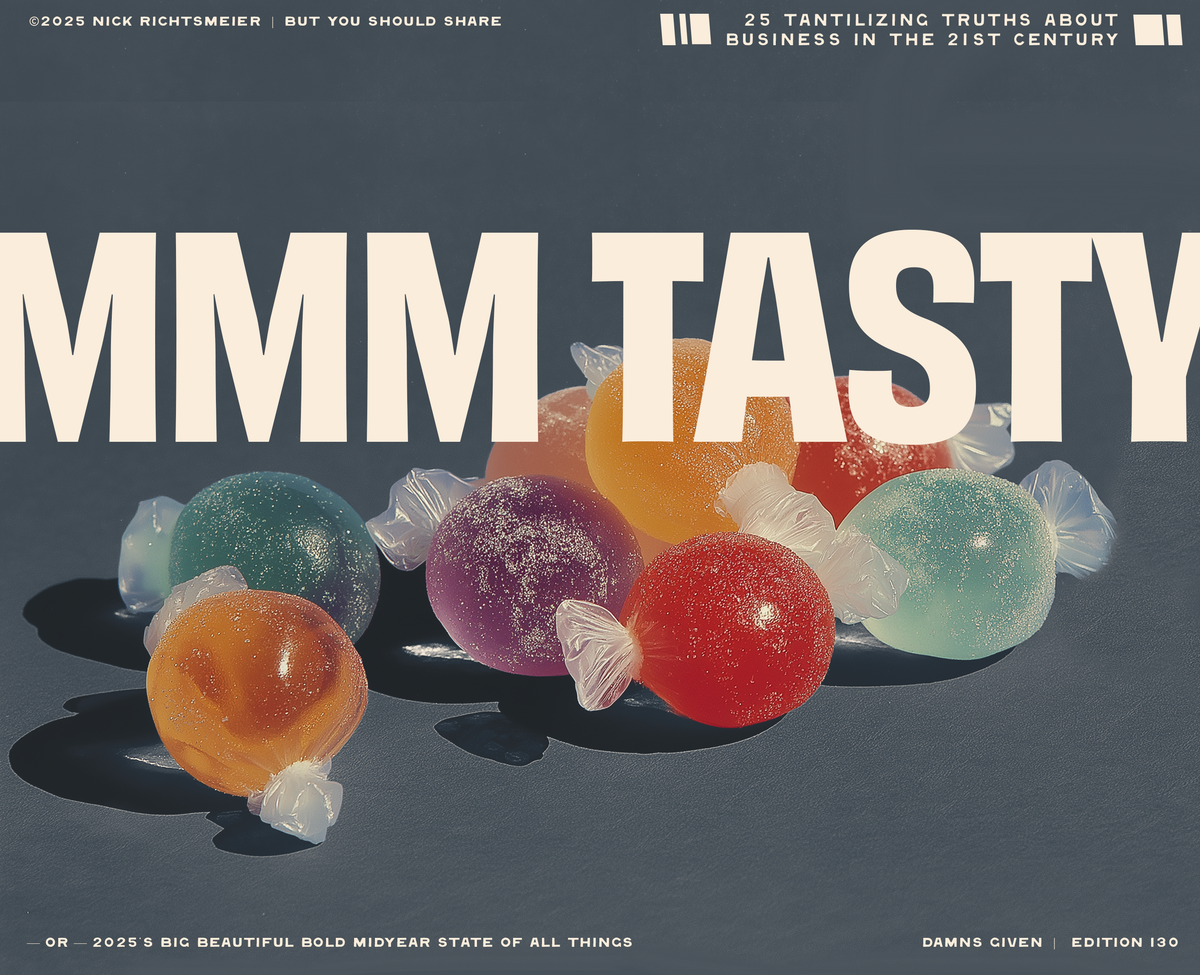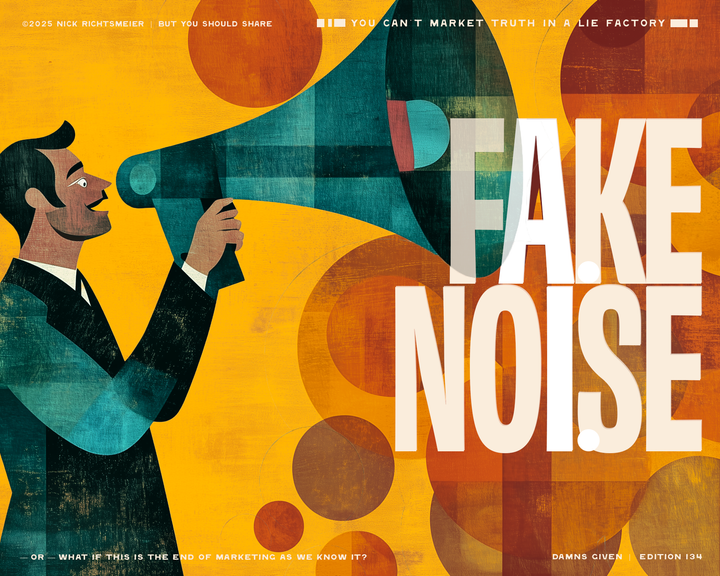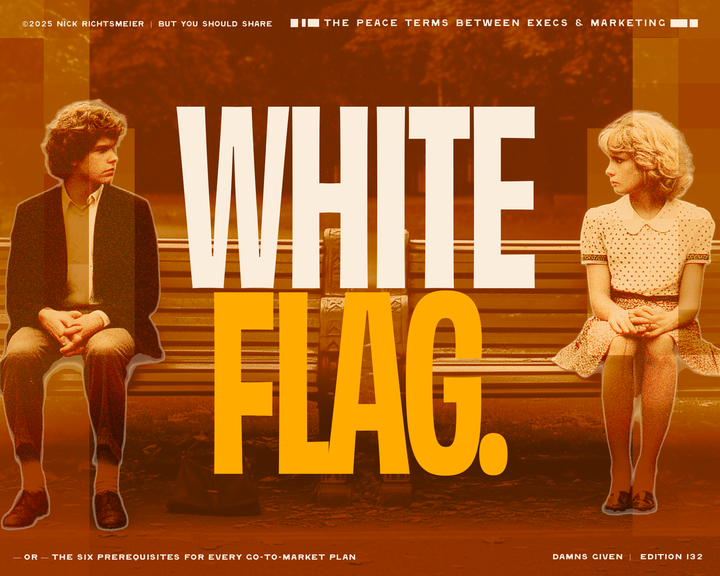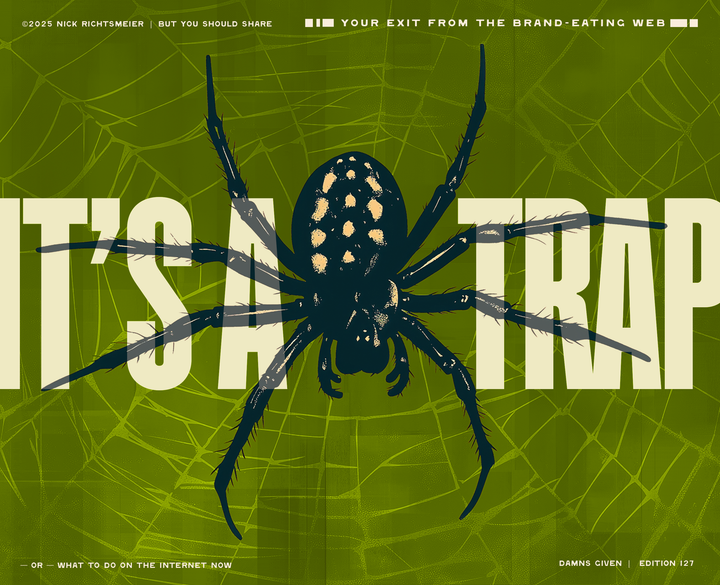25 Tantilizing Truths about Doing Business in the 21st Century (So Far)
The biggest challenge you face is understanding your current position and the assumptions you're making. Orientation is everything.

Edition 130 – OR – 2025's Big, Beautiful, Bold Midyear State of All Things
It's the big, beautiful, bold midyear edition! (I refuse to abandon the qualifiers big and beautiful for political reasons.)
Shortly before the pandemic, I was struck by the observation of how much of the previous century was willfully being dismantled in exchange for a world not-yet defined.Of course, creative destruction is inherent to capitalism, and we live in an era of the most aggressive kind of capitalism human history has ever seen. So I shouldn't have been surprised.
At the time, I'd recently burned through famous curmudgeon Chuck Klosterman's But What if We're Wrong, where he successfully laid out all the times we were pretty sure things were going to gonna zig and whoops! Things zagged. It was a rich text then, all the more so now, when talking heads are so confident about the future they're creating. Surely, the combined powers of Silicon Valley and federal surveillance states will produce historic levels of affluence and gratitude.
Of course, when facing any variety "three years from now it will be X" prognostication, the best approach is to assume wrongheadedness. Maybe not directionally, but certainly in substance. Life (and the business that mimics it) is four-dimensional chess. Somewhere out there, an unseen and unidentified butterfly is flapping its wings, creating the first whisps of a storm that will change everything.
In contrast to prognosticating, we have to take careful stock what's happening now. The most prominent mistakes leaders are making are attribution errors. Assigning success to the wrong actions. Risks to the wrong categories. Opportunities to the wrong points on the compass. The biggest challenge you face, regardless of where you are in the decision-making matrix, is understanding your current position and the direction decisions lead. Orientation is everything.
To that end, this week, I'm bringing us a quick inter-century status quo check: 25 Tantalizing Truths about 21st Century Commerce (So Far)
- The "economy" is two things—one political and one lived—and they couldnt' be more different. The stock market indices (S&P, specifically) are a better gauge of political sentiment than value. The influence of the Magnificent Seven (big tech cos) on the index and how much they are impacted by federal policy and global economics, creates a perceptual and actual rift between the lived economy and the one that shows up in news headlines.
- The private equity playbook is rewriting the rules of "how to win" in an expanding list of major industries. PE runs by a different value framework than market capitalism, more willing to extract value from assets rather than deploy them to earn customers. This shift in "how to win" is turning once value-first industries into Kabuki theaters where firms are now performing for future buyers rather than doing the work of winning customers. The customers are still there... for anyone willing to do the work.
- Leaders have given up on differentiation in the hopes that someone will buy them before anyone finds out. Related to #2, I frequently speak with leaders in PE-heavy industries who are now openly asking, "Is there any use to being different?" The answer is "No" if all you're here to do is be bought eventually. The answer is "Dear God, yes" if you actually want to attract customers.
- Which billionaire is the billionaire-est is headline news. While comedic, this trend in clickbait betrays the shift in power. About 20 people who recently returned from a retreat in an undisclosed location are making most of the decisions, leading leaders to abandon their belief in their own agency. The Second Gilded Age in America threatens a similar rollercoaster to the first. Leaders, this is not the 1990s or even the 2010s. This is 1885.
- A word-guessing machine (LLM) is seen as the height of intelligence. Behind closed doors, AI experts acknowledge broadly that we don't even really know how human intelligence works. But you don't get $100B investments from Sequoia Capital by saying that shit out loud. Publicly, LLMs like ChatGPT and Claude are sold as near-human intelligence, all while they are being pre-designed to pass infamous intelligence tests originally designed for eugenics. LLMs have no reasoning capability other than ever-more refined geometric analysis of layers of probability to select words in sequence. This gap between meaning and the appearance of meaning is making a lot of people very confused.
- Early adoption AI rollouts are getting unwound. Over half of the companies that have laid people off due to AI regret it after the fact. Having nothing to do with this, of course, increased AI usage produces more doubts than confidence.
- Marketing is a dying tradecraft. While strategic marketing is more important than ever, marketing departments have spent most of this century being turned into tactical Make It Pretty/Make It Viral farms that serve no one, despite the marketers best efforts. People skilled in creative strategy (the kind required to grow companies) are women and men without a country and marketing leadership roles are designed with such low-budget fantasy expectation straight jackets that they are unfillable.
- The pump-and-dump VC strategy is now mainstream. If every venture is a capital asset and not a value creator, then we don't need products anymore, we just need PR to lift the perception of importance long enough to sell or embed in the infrastructure of everything. This is the AI strategy writ large, but it's also the growing strategy in the middle market. Founder-led middle-market firms are often destroyed by thinking of themselves as "assets," just as homes are hollowed out by thinking of them as investments. And yet this trend continues, only accelerating the gap in capitalization between the very small and the very large.
- The only way to break through the noise is cultural impact, but everyone is afraid of being wrong about culture. Since the machines make words and images now, what we show and what we say means very little. Unless it makes change. Your ability to move culture, to be stuck in the minds of people you impact, is your only lasting value. Which means weirdness and specificity are required... and simultaneously feared by most C-suites.
- It is impossible to impact culture without being accused of being political. Politics, as I discussed with my podcast partner Brad, is how we decide to live together. It's impossible to move culture without bumping up against politics. The discourse has gotten so silly that many assume any discussion of the body politic is partisan (Woke or MAGA, etc.) When in fact, partisanship is the least interesting and least compelling version of the political.
- We are being asked to build an ownership economy where you don't own your own ideas. Capitalism depends on ownership. And yet, the rise of surveillance tech and the scraping of private work and data across the internet essential to the creation of AI is making ownership a luxury commodity. After DeepSeek "stole" Meta's AI, good ole Zuck realized privacy matters (at least his) and is now building an elite, highly compensated secret AI force for what we can only assume are ethical reasons. Private ownership may come back in fashion?
- Constant surveillance of your customer is seen as reasonable, if not essential, behavior for any business. The code word for this is "first party data," and it's one of the fancy benefits being sold by AI companies. "We'll help you spy on your customers without consent (those internet cookies were a pain in the ass of the past), build a data lake, and then mass produce "personalization at scale" to influence them into buying. This might work, but a ZDR (zer0 data retention) social movement is rising that may protect what's left of customer autonomy.
- AI-Search is rising. But it's entirely dependent on your ability to build a brand. There's a lot of chatter on how to get mentioned in LLM search. This matters mainly because Google is committed to putting its LLM, Gemini, in front of anything else you can click on, so SEO is dying a slow death. However, the basic data structure of LLMs means that it feeds back based on years of data scraping and processing, meaning that if it can't cohere an answer about your brand from all the data it has collected over the years, you're either not going to show up, or it will be incorrect. Ironically, SEO was designed to avoid brand building. And now the one thing you need to make Google Gemini see you is a great brand in 2023. What goes around comes around, etc.
- Everyone exists in a mirrored cage of algorithmic distortion. Given all of the above, its not exaggerated to say there is no central source of truth. 21st-century humans are quite comfortable in our house of mirrors, letting algos tell us what they think we want to hear. For sellers who want customers, this means rethinking neutrality. You can't please everyone because they don't even live in the same world as each other. Building a community of customers requires accepting and engaging their preferred distortions. Pick your facts. Pick your perspective. Pick your customer.
- The biggest risk to leaders is their media diet. See #14.
- A leader's ability to face vulnerability and manage their fear is the primary factor in their long-term results. One painful side effect of a house of mirrors is existential dread. We all feel versions of it. The most powerful people in the world regularly hit the airwaves to tell us that they are facing extinction-level threats. Sam Altman is the king of this trope. But trust is about vulnerability. And leaders (and firms) that depend on trust have to learn to face their own if they want to swim forward in these strange 21st-century waters.
- The internet is closed. I've written about this ad nauseum, but I couldn't leave it off the list because... obviously.
- The cost of SEO and paid ads has risen astronomically versus their outputs, likely only to get worse. Basic macroeconomics here. The web closed up all the competing portals, making paid clicks the only way to move around the web. This monopoly of attention forces more demand into a smaller pool of supply (less traffic on fewer sites means the big sites cost more) is pushing up costs at sometimes 3 and 4x the rate of regular inflation.
- The ability to sell is more important than the ability to market. Now this is a little bit of wordplay, but persuasion is back in fashion. Storytelling, one-to-one or one-to-few contact, and understanding your customer. Knowing the problem. Digital marketing was built to skip all this so no one would have to sell, making every business a serf to Lord Google and Viscount Meta. The decline of the digital workaround is good news for Brand because Brand is selling at scale.
- Growth is more dependent on service offering and client experience than it is on marketing tactics. If you're not growing organically, the first place to look is how your packaging the offer and the pain you're putting people through to get it. Much of the pain you are causing them is tech-created. Automated emails, cobbled together "portals" and "dashboards," belabored intake procedures to make sure your CRM and attribution works... your customer is paying in pain for you to be able to say how you got them.
- Content marketing, once the growth engine of value-delivering firms, is now a formula for distrust. All that free how-to content overwhelming your blog and socials? Looks like a thirst trap to me. The difference between people taking off their shirts for Instagram and businesses talking endlessly about how much they can help is nil in 2025. If you want to be trusted, say less better.
- Digital platforms are flattening language itself, so leaders who can still speak like humans are immediate differentiators. AI voice, the broetry of LinkedIn, all algorithmically induced syntax collapse. Warmth, personal anecdotes, humility, vulnerability, humor, sarcasm, creative wordcraft... all the ways you would get flagged by Grammarly... are now engines for differentiation. If you're into that kind of thing. (See #3)
- Essential culture-making words—such as friend, conversation, like, engagement, connection, attention, value, and others—have been reduced to digital transactions. It's just functionally harder to talk about what matters in growing a business than it used to. Because language creates reality, our limited vocabulary is producing limited action. You've got to redefine terms.
- Social media is a wasteland of late-stage influencers and would-be "thought leaders" performing for bots, hoping they will get platformed by an algorithm. Most web and social traffic (more than 50%) is bots or AI-generated automation. The vanity metrics the platforms are serving you mean virtually nothing, unless you've learned out to eat or pay payroll with robot clicks.
- Your prospect's best first contact isn't a website, an email, or a social media post. It's a human. Sales-first marketing powered by robust brand coherence is the only controllable way to win. And in most cases, firms built on 2017 logic, have to reconsider their plan to win from the culture, to offering, to CX, to staffing, to messaging. Usually in that order. You can't "spruce up your website" your way out of this.
You might find yourself bearish at this analysis, but for me, I'm all bulls. Not because the road ahead isn't hard, but because it's demarcated. Those with heart and courage have an actionable path to lead, deliver value, inspire talent, and create legacy. When the distraction Olympics are this obtuse, the acute places where good things grow are even easier to find.
You know what to do:
- Understand you have options you can't see.
- Diagnose your complicity in the challenges you face.
- Ask for help on 1 and 2 because they're almost impossible to do alone.
As always, to make this personal to your venture in small ways or large, I'm here for you.
PS - Props to this fun and funky article in Esquire, which gave me the inspiration for the structure of this essay. All the content of this essay is my own.



